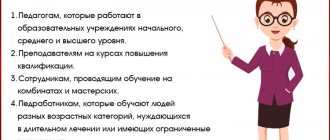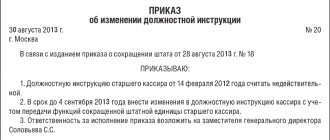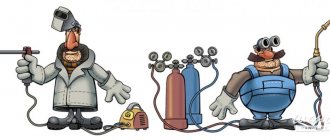Who is a kindergarten teacher?
Upbringing, education, care, supervision - these are the responsibilities of a kindergarten teacher in 2020. Important and mandatory qualities of a teacher are kindness, goodwill, hard work, responsibility, accuracy and resistance to stress. These criteria are enshrined in:
- job description;
- SanPiN 2.4.1.3049-13;
- employment contract.
A kindergarten teacher must love children, have a great desire to become their first guide into adulthood, be able to resolve conflicts, find an approach to each child, provide first aid and cuddle. An employee must take care of his appearance, be able to speak correctly, and find an approach not only to students, but also to their parents. A preschool teacher is an important and responsible job, where you must always be in a good mood and in a good mood. The functional responsibilities of a teacher presuppose that the specialist has a positive attitude towards the child, knows how to treat any child equally, regardless of his behavior, and takes into account the individuality of each pupil.
Filling out the job description for a teacher
- At the beginning of the document its name is written, and below, on the right or left side (it doesn’t matter), a place is allocated for approval by the manager. This includes the full name of the organization (in accordance with registration documents), the position of the head, his last name, first name and patronymic. Two lines must be left blank - the signature and date of approval will be placed here later.
- The main part of the document opens with a section called “General Provisions” . It specifies which group of workers the teacher belongs to (workers, employees, specialists), requirements for the level of education, work experience, and also (if necessary) the availability of medical clearance. Next, the immediate supervisor of the teacher, the employee who is obliged to replace him in case of absence from the workplace (without reference to specific names and surnames), as well as the procedure for his appointment and dismissal from office are indicated.
- After this, the section includes a condition on the teacher’s knowledge of special literature (manuals, training manuals), various rules, laws, regulations, methods and methods of work, as well as documents that the teacher must follow in the performance of his official duties.
- The “Responsibilities” record all those functions that are within the competence of the teacher. This section is the most voluminous, since the tasks, problems, and issues that he must solve as part of his work must be written down especially carefully and in detail. It is this part of the document that in the event of disputes and disagreements between an employer and a subordinate acquires special weight.
- “Rights” section defines the initiatives that the teacher has the right to express to improve the quality of his work. All his powers are indicated here, including permission to demand, report, negotiate, receive information, represent interests and perform other actions that will ultimately lead to an increase in his labor productivity.
- In the “Responsibility” , it is necessary to indicate violations, errors, and misconduct for which the teacher will be punished in the form of a disciplinary sanction (from a simple reprimand to termination of the employment contract). A separate point here can be noted that this part of the job description falls within the framework of the law of the Russian Federation.
- Finally, the job description must be certified by the person who is obliged to monitor the fulfillment of the teacher’s job duties, as well as by the teacher himself. Only after this is the document submitted for approval to the head of the organization.
General provisions
Typically, persons with secondary vocational or higher education in the field of pedagogy, preschool education, psychology or sociology are appointed to the position of educator, preferably with work experience, knowledge of child psychology and speech therapy, methods of development of preschool children. Completion of advanced training courses is desirable.
Familiarity with the job responsibilities of a preschool teacher occurs even before the signing of an employment contract. The employee needs to understand that in order to effectively perform his job, he must have certain personal qualities, because in the profession of an educator they are very important. The most important qualities include:
- love for children and the ability to find an approach to any child;
- organizing abilities;
- positivity and cheerfulness;
- stress and psychological stability;
- communication skills and organization;
- speech literacy and high cultural level;
- the ability to make quick and correct decisions in any situation.
Connections by position of teacher - relationships
As mentioned above, an employee can exchange materials, teaching methods, and also share teaching experience with colleagues.
It is important to understand that the kindergarten team works in order to give the necessary knowledge to children and help them adapt to society. For this purpose, the heads of the institution periodically organize meetings, pedagogical councils, meetings, the purpose of which is aimed at resolving issues regarding the upbringing of children.
Accordingly, a kindergarten employee must take part in such events in the course of his professional activities. A teacher is someone whom children look up to and from whom they learn. Therefore, he himself must constantly improve his qualifications, and the exchange of experience with other employees contributes to this to a greater extent.
Functions
A professional standard is necessary for an employer to understand clear functional requirements for an employee. Order No. 544n dated October 18, 2013 “On approval of the professional standard Teacher (teaching activities in the field of preschool, primary general, basic general, secondary general education) (educator, teacher)” also approved the responsibilities of the teacher when admitting children to the group:
- regulation of student behavior to ensure a safe educational environment;
- implementation of educational opportunities for various types of child activities (educational, play, work, sports, artistic, etc.);
- development of students' cognitive activity, independence, initiative, creative abilities, formation of citizenship, ability to work and live in the modern world, formation of a culture of healthy and safe lifestyle among students;
- the use of constructive educational efforts of parents (legal representatives) of students, assistance to the family in resolving issues of raising a child.
Responsibilities
What are the responsibilities of a kindergarten teacher:
- exercise control over the life and health of children during their entire stay in the kindergarten;
- conducting various types of activities, developmental, sports, preparation for holidays, etc.;
- create a favorable atmosphere that promotes conflict-free communication between children;
- instill self-service skills in students;
- resolve conflicts, show restraint and tact with children and their parents;
- monitor the health status of pupils;
- immediate notification of danger and force majeure situations to immediate superiors or the appropriate service;
- undergo a medical examination according to the schedule.
If the teacher does not fulfill his duties, what should parents do in such a situation? First of all, you need to contact the head of the preschool educational institution, write a statement in two copies, try to resolve the conflict situation and demand a response in writing.
About professional skills
It is clear that a person who wants to become a good teacher must not only be able to help children or organize a holiday for them. You need to be able to find a common language with completely different children, try to notice the problems and achievements of each child, even if there are more than two dozen of them in the group.
The teacher’s job description states that it is necessary to have the following skills:
- Knowledge of not only child psychology, but also the peculiarities of the relationship between parents and children. Every child is unique, but there are still some psychological similarities in each of them: every child needs attention and love. You also need to be able to see a problem in communication between a child and parents and help solve it; this is implied even by the job descriptions of a kindergarten teacher, because understanding should be present from a very tender age.
- The ability to calm and cheer children is a must. A good teacher knows how to use games to interest even the most shy and quiet children, or how to force fidgety children to behave quietly. For example, the job description of a camp teacher is based on the fact that the mentor must be able to create a cohesive team of completely different children who are unfamiliar with each other.
- Who should teach children to maintain the correct daily routine if not the teacher? The job description implies that this is his responsibility. Children must understand the importance of sanitary and hygienic standards.
Rights
The rights and responsibilities of a kindergarten teacher are established by the Labor Code of the Russian Federation, the Federal Law “On Education” and Order of the Ministry of Education and Science dated August 30, 2013 No. 1014:
- make proposals to improve the educational process;
- receive social guarantees and benefits in accordance with the legislation of the Russian Federation;
- demand improved working conditions;
- have paid leave;
- with mutual agreement, exchange shifts with a second employee;
- demand the elimination of faults in the entrusted territory and the creation of normal working conditions.
Parents are responsible for raising their children. Showing respect for teachers and politeness should be the responsibilities of preschool students and their parents.
Sample job description for a teacher
APPROVED by: General Director of Supply Wholesale LLC Shirokov /I.A. Shirokov/ August 12, 2014
Job Description for a Kindergarten Teacher
I. General provisions
1.1. This job description regulates the job functions of the teacher, his powers and rights, and also defines violations and offenses for which disciplinary liability occurs.
1.2. The hiring and dismissal of a teacher occurs in the manner established by the legislation of the Russian Federation and only after the issuance of a separate order from the head of the institution.
1.3. A teacher can be an employee with the following qualifications: specialized secondary or higher specialized (pedagogical, psychological) education, two years of work experience, and a medical clearance document.
1.4. Direct supervisor of the teacher: head of the kindergarten.
1.5. In the absence of a teacher at the workplace, his job functions are transferred to a person who meets the qualification requirements and is appointed by special order of the head of the institution.
1.6. The teacher should be familiar with:
- laws of the Russian Federation regarding labor and civil law;
- internal orders, instructions, resolutions concerning both him personally and the institution as a whole;
- internal labor regulations, labor protection, health and safety standards (including fire, sanitary, electrical safety, environmental, etc.)
- regulations and methodological documents related to the educational process and activities;
- fundamentals of child psychology and pedagogical approaches,
- children's rights;
- ways and methods of raising children and monitoring them;
- rules of communication with students, parents, colleagues in various situations, as well as pedagogical ethics;
- methods of preventing and resolving conflict situations between different age groups;
- various developmental methods (including gaming and non-game);
- rules for compiling records of children’s attendance and reporting to management;
- rules for actions in difficult, dangerous, unforeseen and force majeure circumstances.
II. Job responsibilities of a kindergarten teacher
2.1. The functions of the teacher include solving the following tasks and issues:
- raising children in accordance with their age needs;
- conducting developmental and training sessions in accordance with educational methods, programs and plans,
- ensuring the safety of children while in a group, on a walk, moving within the kindergarten and on its territory;
- filling out and maintaining accounting documentation: including an attendance log;
- teaching students hygiene and personal care standards,
- carrying out activities aimed at improving children's health (together with other kindergarten employees);
- training in the rules of communication with representatives of different age groups;
- familiarizing children with the norms of ethics and aesthetics;
- teaching children to follow a daily routine;
- preparing and holding matinees, as well as other holidays aimed at strengthening friendship between children and building relationships;
- preparation and holding of parent meetings;
- monitoring the health of children, timely and competent response in case of injury to children (seeking medical help from the institution’s nurse and, if necessary, going to an ambulance);
- reporting all non-standard, dangerous, critical, force majeure situations to the immediate supervisor and colleagues;
- individual communication with parents to discuss the character traits of their child, counseling in matters of raising children (within their competence);
- recommendations for children’s participation in various competitions, shows, and events;
- ensuring the safety of inventory items entrusted to his use;
- following the established work schedule;
- regularly improves one’s labor qualifications;
- regular medical examination (at least once a year).
III. Rights
3.1. A kindergarten teacher is vested with the following rights and powers:
- demand from the management of the institution the creation of normal working conditions that comply with the legislation of the Russian Federation;
- propose to the head measures aimed at optimizing the work of the institution in general and himself personally in particular;
- represent the institution in government and non-government organizations (within the boundaries of their competence);
- receive information about all orders, instructions, resolutions of management relating to its activities;
- communicate with representatives of other structural departments of the institution to resolve their own professional issues;
- make independent and independent decisions (within the framework of their activities, subject to mandatory compliance with safety conditions);
- change shifts with a second teacher (with mutual voluntary consent);
- refuse to perform official functions if there is a threat to life or health
IV. Responsibility
If the following situations occur, the teacher may be subject to disciplinary punishment (strictly within the framework of the current law):
4.1. Evasion from fulfilling labor duties, negligent performance.
4.2. Single and regular violation of internal labor regulations, work and rest schedules, discipline, subordination.
4.3. Neglect of safety standards (fire safety, sanitary safety, electrical safety, etc.).
4.4. Disclosure of classified and confidential information about the institution's students.
4.5. Providing unreliable or deliberately false information about children to their parents and the administration of the institution;
4.6. Violation of communication norms (rudeness, use of profanity, etc.).
4.7. Failure to comply with orders and instructions of the manager, as well as higher authorities.
4.8. Causing material damage to the institution, students or any of the employees.
4.9. Exceeding one's powers;
AGREED Senior teacher of MDOU No. 12 Pishulina / Pishulina R.D./ August 12, 2014
THE INSTRUCTIONS HAVE BEEN READ: Gushchina Inna Mikhailovna Educator, MDOU No. 12 Passport 5748 No. 857463 Issued by the Department of Internal Affairs of the Leninsky District of Perm on September 14, 2012 department code 123-425 Signature of Gushchin August 17, 2014
Responsibility
The responsibilities of a kindergarten teacher according to the Federal State Educational Standards (Federal State Educational Standards) include responsibility for:
- preserving the life and health of children in the group;
- safety of pupils’ personal belongings;
- compliance with safety and labor protection instructions;
- the use of unacceptable methods of education, violence and rudeness;
- inappropriate performance and failure to complete one's work;
- use of working time for personal purposes;
- abuse of authority.
The responsibilities of a teacher in the nursery group of a kindergarten differ from what they have to do in the younger group of a kindergarten. Children come to the nursery very young, often not even able to speak, they are not yet able to fully take care of themselves, and often cry. And in the younger group, the pupils are older, more responsible, and the majority have already undergone initial adaptation to new conditions.
General list of teacher responsibilities
The work of a teacher is complex and very responsible. Not only the physical health, but also the psychological well-being of the children depends on how educated, literate and loyal this person is to children. Since a child can go to kindergarten at a very young age, for example, in a nursery group, it largely depends on the educators what kind of person he will grow up to be. This is due to the fact that kindergarten employees work with children up to the age of seven, and it is during this period that the basic knowledge, skills and character of the child, his inclinations, behavior, aspirations for learning and further development are laid.
That is why very serious demands are placed on the teacher. He must be well-mannered, literate, clean, have no bad habits, have a well-trained pleasant voice, and be able to quickly and correctly respond to a rapidly changing situation in the group. He will have to work with children, each of whom has his own character, manner of communication, inclinations and talents. The teacher will have to find a common language with each of the kids, “reach out” to the withdrawn child, cool down the ardor of the reactive child, and be able to establish friendly relationships within the group, as well as connections between groups of children of different ages.
In addition to direct contact with children, the teacher will have to collaborate with the teaching staff and work in close relationships with the students’ parents. He will be required to be correct, be able to clearly convey his thoughts, speak competently, and also maintain subordination.
Depending on the level of qualifications and position held, the teacher must engage in both educational and educational activities, and develop children’s communication skills, creative inclinations and talents, monitor their health, cleanliness and order in the group premises, provide conditions for a full-fledged daytime (and night in 24-hour gardens) sleep and rest. If necessary, the teacher can feed a small child, teach him to do it on his own if he is not taught at home by his parents, and also help the baby cope with complex dishes.
High demands are also placed on the teaching staff of the kindergarten to carry out educational work, strictly adhere to the schedule of classes and obtain high results. Children in each group must correspond to the level of development for their age and without problems fulfill those standards that are considered the norm for a given age period.
In addition to upbringing and education, teaching staff are involved in organizing and conducting leisure activities for children. This applies not only to daily mandatory walks, but also to holidays, pupils’ birthdays, and special events. In kindergarten, children learn to sing, dance, draw, sculpt, and do other types of arts and crafts.
All their achievements and the advantages obtained from their implementation, the achievements of the children's group and individual pupils are necessarily recorded, documentary evidence is collected and preserved. The teacher will need them to undergo certification to confirm the position held or to obtain a higher qualification level.






